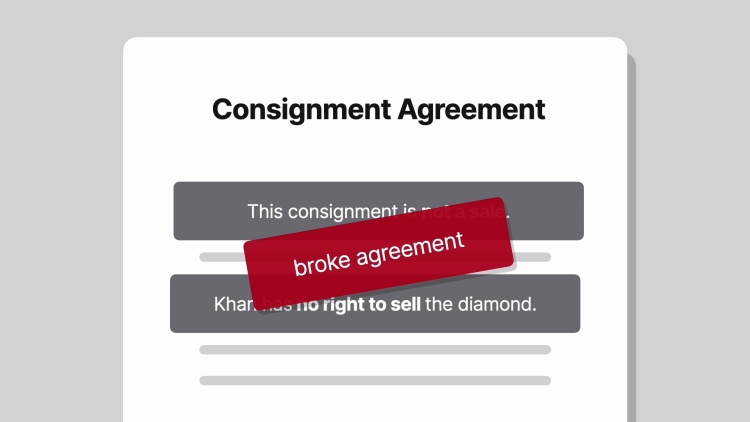Zaretsky v. William Goldberg Diamond Corp.
United States Court of Appeals for the Second Circuit
820 F.3d 513 (2016)
- Written by Rose VanHofwegen, JD
Facts
In 2003, William Goldberg Diamond Corp. (WGDC) (defendant) consigned a large diamond to celebrity stylist Derek Khan to dress his clients. The consignment agreement did not give Khan any title or rights to sell the diamond. If a client wanted to buy it, WGDC had to approve and invoice the sale. Khan never returned the diamond. Eventually a diamond supplier sold it to a couple, who later gave it to their daughter and son-in-law, Suzanne and Stephen Zaretsky (plaintiffs). When the Zaretskys had the diamond appraised for insurance purposes in 2012, it was identified as stolen and held until its ownership was resolved. The Zaretskys sued, arguing Khan could transfer title as a dealer, and presented Kahn’s written declaration claiming specialized knowledge or skill in the trade. The trial court found that Khan was a jewelry “merchant” under the New York Uniform Commercial Code (NYUCC) with power to transfer title to entrusted jewelry and denied WGDC summary judgment. WGDC appealed, arguing that Khan never sold any jewelry entrusted to him and did not qualify as a dealer. The Zaretskys countered that even if Khan was not a dealer, he held voidable title that could be transferred because WGDC’s consigning the diamond qualified as a transaction of purchase.
Rule of Law
Issue
Holding and Reasoning (Sack J.)
What to do next…
Here's why 908,000 law students have relied on our case briefs:
- Written by law professors and practitioners, not other law students. 47,100 briefs, keyed to 997 casebooks. Top-notch customer support.
- The right amount of information, includes the facts, issues, rule of law, holding and reasoning, and any concurrences and dissents.
- Access in your classes, works on your mobile and tablet. Massive library of related video lessons and high quality multiple-choice questions.
- Easy to use, uniform format for every case brief. Written in plain English, not in legalese. Our briefs summarize and simplify; they don’t just repeat the court’s language.





